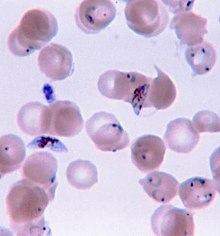Parasite load is a measure of the number and virulence of the parasites that a host organism harbours. Quantitative parasitology deals with measures to quantify parasite loads in samples of hosts and to make statistical comparisons of parasitism across host samples.
In evolutionary biology, parasite load has important implications for sexual selection and the evolution of sex, as well as openness to experience.[1]


- ^ Thornhill, Randy et al. Zoonotic and Non-zoonotic Diseases in Relation to Human Personality and Societal Values: Support for the Parasite-Stress Model. Evolutionary Psychology, 2010. 8(2): 151-169